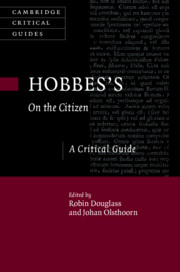Book contents
- Hobbes’s On the Citizen
- Cambridge Critical Guides
- Hobbes’s On the Citizen
- Copyright page
- Contents
- Contributors
- Acknowledgments
- Abbreviations
- Introduction
- Chapter 1 Excavating On the Citizen
- Chapter 2 Hobbes and Aristotle on the Foundation of Political Science
- Chapter 3 All the Mind’s Pleasure: Glory, Self-Admiration, and Moral Motivation in On the Citizen and Leviathan
- Chapter 4 The Right of Nature and Political Disobedience: Hobbes’s Puzzling Thought Experiment
- Chapter 5 Motivation, Reason, and the Good in On the Citizen
- Chapter 6 Property and Despotic Sovereignty
- Chapter 7 Sovereignty and Dominium: The Foundations of Hobbesian Statehood
- Chapter 8 Corporate Persons without Authorization
- Chapter 9 Hobbes on Love and Fear of God
- Chapter 10 “A Rhapsody of Heresies”: The Scriptural Politics of On the Citizen
- Chapter 11 On the Citizen and Church-State Relations
- Chapter 12 Sovereign-Making and Biblical Covenants in On the Citizen
- Bibliography
- Index
- Cambridge Critical Guides
Chapter 12 - Sovereign-Making and Biblical Covenants in On the Citizen
Published online by Cambridge University Press: 15 November 2019
- Hobbes’s On the Citizen
- Cambridge Critical Guides
- Hobbes’s On the Citizen
- Copyright page
- Contents
- Contributors
- Acknowledgments
- Abbreviations
- Introduction
- Chapter 1 Excavating On the Citizen
- Chapter 2 Hobbes and Aristotle on the Foundation of Political Science
- Chapter 3 All the Mind’s Pleasure: Glory, Self-Admiration, and Moral Motivation in On the Citizen and Leviathan
- Chapter 4 The Right of Nature and Political Disobedience: Hobbes’s Puzzling Thought Experiment
- Chapter 5 Motivation, Reason, and the Good in On the Citizen
- Chapter 6 Property and Despotic Sovereignty
- Chapter 7 Sovereignty and Dominium: The Foundations of Hobbesian Statehood
- Chapter 8 Corporate Persons without Authorization
- Chapter 9 Hobbes on Love and Fear of God
- Chapter 10 “A Rhapsody of Heresies”: The Scriptural Politics of On the Citizen
- Chapter 11 On the Citizen and Church-State Relations
- Chapter 12 Sovereign-Making and Biblical Covenants in On the Citizen
- Bibliography
- Index
- Cambridge Critical Guides
Summary
In On the Citizen, Hobbes describes two kinds of covenants. The first are covenants among human beings, most importantly sovereign-making covenants, which create human sovereigns. The second kind are the major biblical covenants, which have God as a party. Hobbes follows the traditional interpretation of biblical covenants, according to which God is a party to them with Abraham, the Israelites at Mt. Sinai, and all humanity. Ironically, his theory had the resources to give a single account of both kinds of covenants. He could have said that God accepted the transfer of rights from humans. So Hobbes treats the biblical covenants involving God and human beings differently from ordinary sovereign-making covenants. He does not say why or discuss any relationship that may exist between the two kinds. Another odd feature of Hobbes’s handling of biblical concepts is that while the covenant with Abraham is a new covenant, the ones with Isaac, Jacob, Moses, David, Solomon, and Jesus in some way renew Abraham’s. A significant common element between ordinary sovereign-making covenants and the central biblical ones is faith.
Keywords
- Type
- Chapter
- Information
- Hobbes's On the CitizenA Critical Guide, pp. 217 - 235Publisher: Cambridge University PressPrint publication year: 2019

